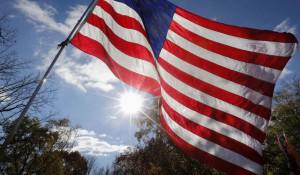The American Flag: Not Allowed on Cinco de Mayo?
While it’s traditional to wear a Sombrero or other festive Cinco De Mayo items on May 5th, students in a California school district were not be allowed to wear an American flag on their clothing on Cinco De mayo as schools were concerned that this would provoke racial conflicts throughout the student body and offend Mexican students. You might think this restriction by the school district is against the 1st Amendment freedom of speech and association, but the school’s policy was actually upheld by the Ninth Circuit of Appeals favoring the schools actions.
 In response to the Ninth Circuits course of action, live protests from different affiliated groups such as the Tea Party protested outside of Live Oak High School in Morgan Hill, CA, wearing American flag t-shirts and clothing on the Cinco de Mayo holiday.
In response to the Ninth Circuits course of action, live protests from different affiliated groups such as the Tea Party protested outside of Live Oak High School in Morgan Hill, CA, wearing American flag t-shirts and clothing on the Cinco de Mayo holiday.
The First Amendment freedom of speech right does not protect all kinds of speech. For example, it does not protect obscenity, fighting words, true threats, child pornography, and subversive advocacy. The question is, which unprotected speech category would “wearing a flag on Cinco de Mayo” fall under? Subversive advocacy? Consider:
Subversive advocacy speech is defined as speech that encourages mayhem and disorderly conduct. Courts define this type of speech as speech that advocates lawless action, which is instant and imminent, as compared to speech that encourages lawlessness at some time in the future.
It seems obvious that wearing an American flag on a Mexican holiday could possibly upset some Mexican students. Cinco de Mayo is an especially sensitive holiday for Mexicans living in America, since many parts of America once belonged to Mexico. The policy upheld by the Ninth Circuit Court of Appeals seems to be more of a safety measure than a discrimination against the American flag.

Comments